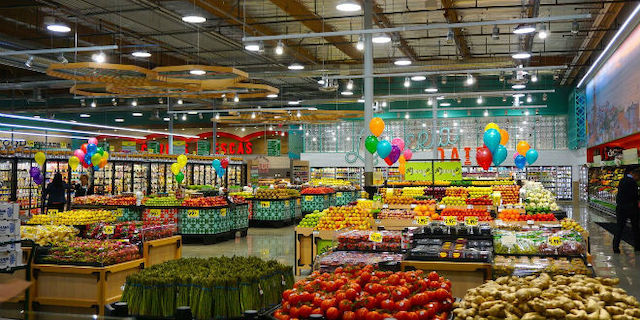 “Every time we step through its doors we enter into a battle with our enemy, the supermarket corporation, whose motives are totally opposed to our own. While we hope to do our shopping quickly and efficiently, buying just [what is on our list], the supermarket owners would prefer we spend hours strolling slowly through the aisles and reaching for new products left and right, products that we neither need nor want” (emphasis added).
“Every time we step through its doors we enter into a battle with our enemy, the supermarket corporation, whose motives are totally opposed to our own. While we hope to do our shopping quickly and efficiently, buying just [what is on our list], the supermarket owners would prefer we spend hours strolling slowly through the aisles and reaching for new products left and right, products that we neither need nor want” (emphasis added).
The above is a quote from an interview of the authors of the German bestseller How We Eat with Our Eyes and Think with Our Stomach, recently published in English.
To be fair, the book appears to promote healthy, mindful eating and gives tips how to shop for food more rationally, as opposed to on impulse. As far as I can tell, the authors are not advocating more government regulation of supermarkets or of people’s diets.
However, their interview comments reflect the common view of corporations as evil manipulators that are trying to harm their customers—in this case, ruin their health—in the pursuit of profits. That view is not founded in reality and therefore cannot be left unchallenged.
The idea that corporations are trying to dupe their customers into buying things they don’t need or want, or to ruin their health, in pursuit of profits, defies all facts and logic. It is true that companies are pursuing their (their owners’) self-interest by producing and trading goods and services to create wealth. But it is not true that their self-interest can be achieved by harming others, least of all their customers.
For corporations to be able to create wealth for their owners, they must first create value for their customers. Business cannot be a zero-sum game where corporations’ owners reap profits while everyone else loses. A corporation that does not offer value to its customers and trade by mutual consent with everybody (customers, employees, and suppliers), cannot continue to exist.
Corporations that try to manipulate customers to buy products they “don’t need or want” will lose customers. Such corporations cannot continue to exist, as customers will switch to competitors that offer them what they need and want.
It is true that supermarkets offer an enormous array of products and use marketing and sales techniques to draw shoppers’ attention to new items—or temptations, as the German authors call them—that food manufacturers develop continually. However, to claim that supermarkets are our “enemy” because they sell, not only vegetables, milk and (whole grain) bread, but also cookies, ice cream and potato chips, would be laughable if it wasn’t so far from the truth.
Supermarkets, as all businesses, are our friends, not our enemies. They make our lives better: they provide and trade with us the material values on which our lives and well-being depend—based on what we want and choose.
Besides offering a huge selection of foods and household goods, supermarkets make their products affordable to us due to the volume of goods they handle, thus enhancing our standard of living and allowing us to spend a larger portion of our income on other values.
Supermarkets offer also convenience, by making one-stop-shopping possible and thus saving us time. (And the convenience will increase further when most of us will order groceries online, which will then be delivered by autonomous vehicles, or by drones).
Supermarkets do not dictate what we buy; they provide what the market demands. Thus, the variety of products on offer. If a product does not sell, it will be quickly removed from the shelves. It is the market—us—that dictates what supermarkets sell.
If you are not convinced that supermarkets are our friends, think about the alternatives: spending the time to shop at number of specialty stores, from a bakery to a green grocers to a butcher shop, to buy all the food and household items you need. Or, you could be bartering with others: our bushels of apples for someone else’s eggs or vegetables.
Or you could ask Venezuelans whether they would prefer well-stocked supermarkets to empty shelves and the desperate shortages of food.
Supermarkets are our friends and provide us a tremendous value. We can opt to shop in them or not, and choose to buy what we want and need. The freedom and responsibility of choice is ours.
Jaana Woiceshyn teaches business ethics and competitive strategy at the Haskayne School of Business, University of Calgary, Canada. She has lectured and conducted seminars on business ethics to undergraduate, MBA and Executive MBA students, and to various corporate audiences for over 20 years both in Canada and abroad. Before earning her Ph.D. from the Wharton School of Business, University of Pennsylvania, she helped turn around a small business in Finland and worked for a consulting firm in Canada. Jaana’s research on technological change and innovation, value creation by business, executive decision-making, and business ethics has been published in various academic and professional journals and books. “How to Be Profitable and Moral” is her first solo-authored book.


